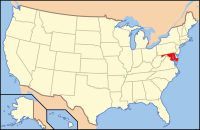|
County Allegany, Maryland
County Allegany adalah sebuah county yang terletak di bagian barat laut dari Negara bagian Maryland. Berdasarkan Sensus 2010, jumlah penduduknya mencapai 75,087 jiwa.[1] County seat dari county ini adalah di Cumberland.[2] Area ini termasuk dalam bagian Maryland Barat. Nama Allegany muncul dari kata dalam Bahasa Lenape, welhik hane[3][4] atau oolikhanna, yang berarti 'pancaran terbaik dari sungai di bukit' atau 'arus indah'.[5]
County Allegany adalah bagian dari Cumberland, MD-WV Metropolitan Statistical Area.
Referensi
- ^ "State & County QuickFacts". United States Census Bureau. Diarsipkan dari versi asli tanggal 2011-06-06. Diakses tanggal August 20, 2013.
- ^ "Find a County". National Association of Counties. Diakses tanggal 2011-06-07.
- ^ "welhik". Lenape Talking Dictionary. Diakses tanggal 2011-12-14.
- ^ "Heckewelder here does not give the strict meaning of hanne. The word in common use among Algonkin [i.e., Algonquian] tribes for river is sipu, and this includes the idea of 'a stream of flowing water'. But in the mountainous parts of Pennsylvania, Maryland, and Virginia sipu did not sufficiently convey the idea of a rapid stream, roaring down mountain gorges, and hanne takes its place to designate not a mere sipu, or flowing river, but a rapid mountain stream." Russell, Erret (1885). "Indian Geographical Names". The Magazine of Western History. 2 (1): 53–59. Diakses tanggal 2011-12-14.
- ^ Alleghany, or as some prefer to write it, Allegheny,—the Algonkin name of the Ohio River, but now restricted to one of its branches,—is probably (Delaware) welhik-hanné or [oo]lik-hanné, 'the best (or, the fairest) river.' Welhik (as Zeisberger wrote it) is the inanimate form of the adjectival, meaning 'best,' 'most beautiful.' In his Vocabulary, Zeisberger gave this synthesis, with slight change of orthography, as "Wulach'neü" [or [oo]lakhanne[oo], as Eliot would have written it,] with the free translation, "a fine River, without Falls." The name was indeed more likely to belong to rivers 'without falls' or other obstruction to the passage of canoes, but its literal meaning is, as its composition shows, "best rapid-stream," or "finest rapid-stream;" "La Belle Riviere" of the French, and the Oue-yo´ or O hee´ yo Gä-hun´-dä, "good river" or "the beautiful river," of the Senecas. For this translation of the name we have very respectable authority,—that of Christian Frederick Post, a Moravian of Pennsylvania, who lived seventeen years with the Muhhekan Indians and was twice married among them, and whose knowledge of the Indian languages enabled him to render important services to the colony, as a negotiator with the Delawares and Shawanese of the Ohio, in the French war. In his "Journal from Philadelphia to the Ohio" in 1758, after mention of the 'Alleghenny' river, he says: "The Ohio, as it is called by the Sennecas. Alleghenny is the name of the same river in the Delaware language. Both words signify the fine or fair river." La Metairie, the notary of La Salle's expedition, "calls the Ohio, the Olighinsipou, or Aleghin; evidently an Algonkin name,"—as Dr. Shea remarks. Heckewelder says that the Delawares "still call the Allegany (Ohio) river, Alligéwi Sipu,"—"the river of the Alligewi" as he chooses to translate it. In one form, we have wulik-hannésipu, 'best rapid-stream long-river;' in the other, wuliké-sipu, 'best long-river.' Heckewelder's derivation of the name, on the authority of a Delaware legend, from the mythic 'Alligewi' or 'Talligewi,'—"a race of Indians said to have once inhabited that country," who, after great battles fought in pre-historic times, were driven from it by the all-conquering Delawares,—is of no value, unless supported by other testimony. Trumbull, J. Hammond (1870). The Composition of Indian Geographical Names. Hartford, Conn. hlm. 13–14. Diakses tanggal 2011-12-14.
|



